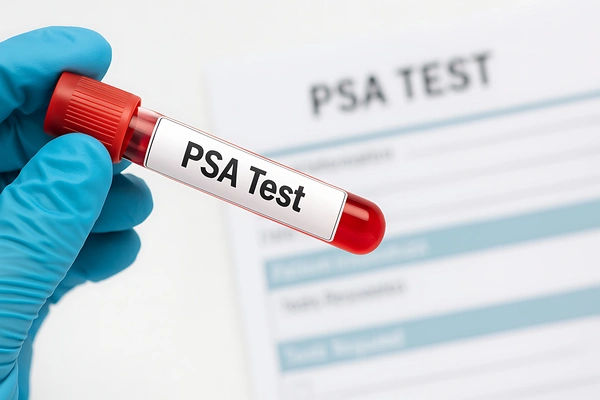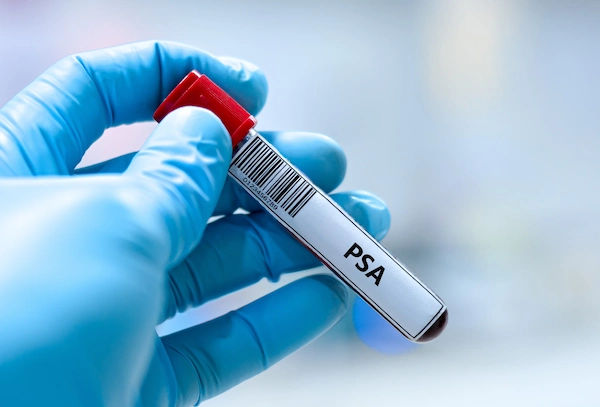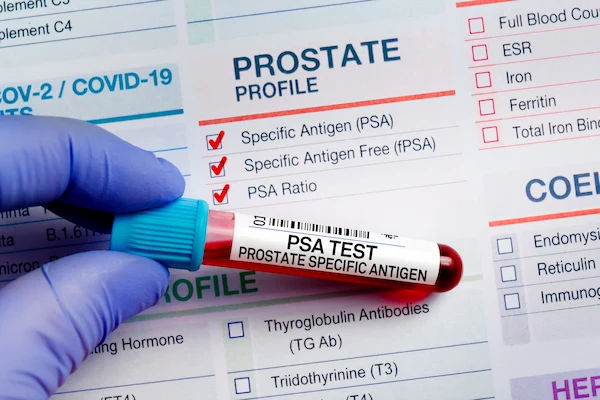How Reliable Are PSA and Free PSA Tests for Prostate Cancer?
PSA and free PSA tests are commonly used for detecting prostate cancer, but how reliable are they? Learn about their accuracy, limitations, and how results guide further diagnosis or treatment.

Written by Dr. J T Hema Pratima
Reviewed by Dr. D Bhanu Prakash MBBS, AFIH, Advanced certificate in critical care medicine, Fellowship in critical care medicine
Last updated on 6th Aug, 2025

Prostate cancer can be considered one of the most common cancers in men over 45 years. Thus, early detection plays a vital role in improving treatment outcomes. Understanding the reliability of a PSA test accuracy is essential for monitoring prostate health, especially for men over 45 years of age and their families. The PSA (Prostate-Specific Antigen) test, with free PSA, aids in measuring blood markers to detect potential prostate cancer issues.
Although these tests play a vital role in identifying prostate cancer risk or recurrence, their results can be influenced by non-cancerous conditions. This may raise questions about trust and accuracy. This comprehensive blog will explore PSA test accuracy, the value of free PSA in prostate cancer detection, and what PSA and free PSA results may mean. Additionally, it may offer individuals clarity on their role in post-treatment follow-up and empower informed discussions with healthcare providers.
Understanding PSA Testing
Before understanding reliability, it is essential to first understand what a PSA test is and why it is a standard screening method for prostate health.
What is a PSA Test?
The PSA test is a simple blood test that measures the level of PSA in a man’s bloodstream. It is a protein produced by both normal and cancerous prostate tissue. Higher levels of the test may indicate a range of prostate conditions, including prostatitis, benign enlargement or cancer.
Why PSA Testing Matters?
PSA testing matters for the following reasons:
- Risk Assessment: Periodic PSA testing may benefit men with a family history or other risk factors to help them monitor potential changes.
- Early Detection: PSA testing may help identify prostate cancer at an early, more treatable stage, even before the symptoms may appear.
- Monitoring Existing Conditions: PSA testing may help those already diagnosed with prostate issues to help them track disease progression or treatment effectiveness.
Though PSA testing may not be diagnostic on its own, it can serve as an essential first step in identifying risk, helping to guide further investigations when needed.
Free PSA and Its Value
Along with total PSA, the free PSA test may offer individuals with additional insight, especially when total PSA levels fall within a ‘grey area’ that is neither clearly normal nor definitively high.
What is Free PSA?
PSA exists in two forms in the bloodstream:
- Bound PSA: This is attached to proteins.
- Free PSA: This circulates freely without being bound.
The free PSA test measures the proportion of unbound PSA relative to the total PSA. This percentage can help in differentiating between benign prostate conditions and prostate cancer.
Benefits of Free PSA for Prostate Cancer Detection
Here are a few benefits:
- Reducing Unnecessary Biopsies: When total PSA levels are borderline (e.g. 4-10 ng/mL), the free PSA ratio can help in avoiding unnecessary invasive testing.
- Greater Specificity: A lower percentage of free PSA (typically below 10-15%) may be more likely to indicate cancer, whereas a higher rate may suggest a benign condition.
- Supporting Risk Stratification: To better assess a person’s cancer risk, doctors use free PSA results alongside age, prostate size and family history.
The free PSA for prostate cancer analysis may help in enhancing the diagnostic value of PSA testing, offering more nuanced information that supports clearer and more informed decisions.
How Reliable are the Tests?
Although it is important to understand that no test can be perfect, understanding the accuracy and limitations of PSA and free PSA tests may help in building trust in the process and set realistic expectations for patients.
PSA Test Accuracy
The strengths and limitations of PSA test accuracy can be:
- False Positives: Around 75% of men with elevated PSA do not have prostate cancer, as per a study, which may lead to potential anxiety and further testing.
False Negatives: PSA levels sometimes may appear normal even when cancer is present, particularly in early or slow-growing forms. - Higher Sensitivity, Lower Specificity: PSA tests are considered effective for detecting changes in prostate health. However, these may not always confirm cancer. Elevated PSA may be caused by benign conditions.
- Influencing Factors: PSA levels can be affected by age, recent ejaculation, urinary tract infections, vigorous exercise or prostate stimulation during a digital rectal exam.
Free PSA Reliability
Here are a few reasons why free PSA testing can be reliable:
- Useful in Biopsy Decisions: Men who get a lower free PSA percentage are more likely to be recommended for a biopsy. Those with a higher percentage may avoid unnecessary procedures.
- Improves Diagnostic Confidence: When used with total PSA, free PSA increases diagnostic accuracy, especially in the 4-10 ng/mL PSA range.
- Like total PSA, the free PSA test isn’t a conclusive cancer diagnosis tool, but it can prove to be a valuable part of a multi-layered assessment.
Reliable Testing at Trusted Platforms
Platforms like Apollo 24|7 offer accurate, affordable, accessible and reliable PSA testing and Free PSA testing across India through its website and app.
- Patients can book lab tests online easily and choose between diagnostic centres or home sample collection. Results can also be accessed digitally with fast turnaround times. Individuals can also consult with expert health advisors if further interpretation or treatment planning is required.
- These services make PSA and Free PSA testing more trustworthy, convenient, and patient-centric, especially for men who prefer discreet, time-efficient care.
- While no test can guarantee 100% certainty, combining PSA and free PSA analysis, especially when done through trusted platforms like Apollo 24|7, can significantly enhance clarity in diagnosis and confidence in the patient.
When to Repeat Testing?
For men with elevated PSA, inconclusive results or borderline readings, repeat testing can often be the most practical next step rather than jumping to invasive procedures.
Below are the times when individuals can consider doing a repeat test:
- Rapid PSA Rise: If PSA levels rise over time rapidly (e.g. more than 0.75 ng/mL per year), further tests or biopsies may be considered.
- Slight PSA Elevation (4-10 ng/mL): A repeat test in 6–12 weeks is typically advised to rule out temporary factors such as infection or recent physical activity.
- Normal PSA but Family History or Symptoms Persist: Typically, repeat testing can be suggested annually for high-risk individuals, even if current levels are within the normal range.
- Low Free PSA Percentage: If free PSA is consistently low, doctors may recommend a biopsy even if total PSA is only moderately high.
- Post-Treatment Surveillance: Regular PSA monitoring is crucial for those treated for prostate cancer to track remission or recurrence.
- Repeat testing can allow doctors to differentiate between temporary changes and meaningful trends.
Interpreting Results
Below are ways individuals can interpret PSA and free PSA results:
- Normal PSA Range: Typically up to 4.0 ng/mL. However, this can vary by age and laboratory standards.
- Borderline PSA (4-10 ng/mL): This is often called the ‘diagnostic grey zone’, which requires careful evaluation, often with free PSA testing.
- High PSA (>10 ng/mL): It may indicate a higher chance of prostate cancer, though further imaging and biopsy are usually required.
- Free PSA Ratio: >25% free PSA may mean lower risk of cancer, 10-25% free PSA may mean intermediate risk, and <10% may mean higher cancer risk
Get Your Health Assessed Here
Conclusion
Prostate health is a critical concern for men over 45 years, and PSA test accuracy, alongside free PSA analysis, can provide a reliable means of identifying potential issues early on. While these tests are not foolproof, they play an essential role in proactive prostate cancer screening and ongoing monitoring.
Platforms like Apollo 24|7 can offer trusted PSA and free PSA testing, backed by accessibility, convenience and clinical excellence.




